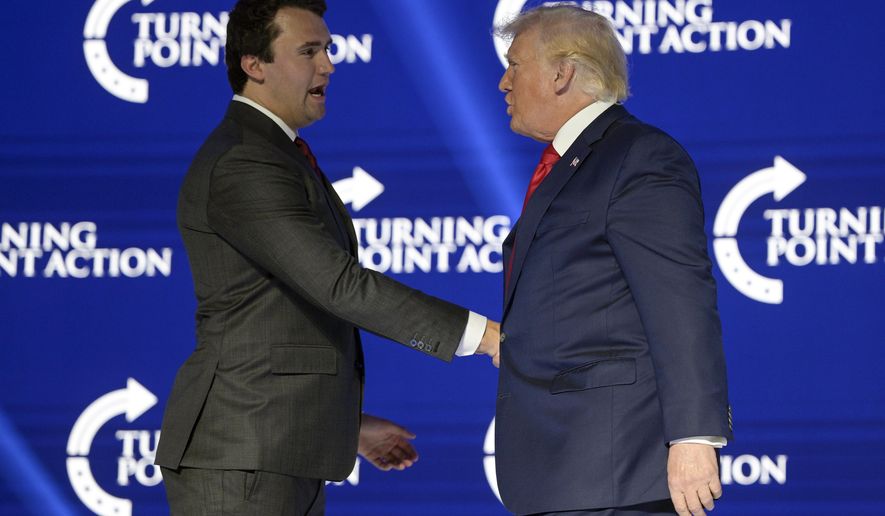Republicans are scrambling to change Nebraska’s electoral voting system to prevent a scenario in which President Biden beats former President Donald Trump in November by way of the state’s Democrat-leaning Omaha district.
The conservative activist group Turning Point USA was rallying Tuesday in Omaha to pressure Gov. Jim Pillen, a Republican, to call a special legislative session to try to change the state’s quirky electoral voting system.
At the same time, Never Trump Republicans began running ads in the 2nd District to urge residents to call their state lawmakers and tell them not to make any changes, The Hill reported.
Influential conservative talk show host Mark Levin weighed in this week, urging listeners to call Mr. Pillen “and politely ask” that he call a special session to fix the Electoral College vote “so the winner of the popular vote in Nebraska wins all the electoral votes.”
Nebraska is one of two states that awards presidential Electoral College votes based partly on the winners of individual congressional districts.
The unusual system, signed into Nebraska law in 1991, could give Mr. Biden the one-vote edge he needs to beat Mr. Trump, the GOP’s presumptive nominee.
Maine employs a similar system, and it allowed Mr. Trump in both 2016 and 2020 to snag one of the blue-leaning state’s Electoral College votes.
The remaining 48 states use a winner-take-all system that awards electoral votes to the presidential candidate who wins the popular vote statewide.
In Nebraska, three of the five electoral votes are awarded to winners in each of the three districts. Two more are handed to the presidential candidate who wins the most votes statewide.
The formula in Nebraska made it possible for Mr. Biden to win one of the state’s five electoral votes in 2020 thanks to Omaha’s Democratic-leaning 2nd Congressional District.
Republicans fear a repeat in Omaha could hand Mr. Biden a second term if he holds on to Michigan, Minnesota, Pennsylvania and Wisconsin, which are part of the “blue wall” of states Democrats traditionally win.
Even if Mr. Trump flips Arizona, Georgia and Nevada and holds onto Florida, North Carolina, and Ohio, Mr. Biden would eke out a 270-268 Electoral College win if Nebraska’s 2nd District votes for him, as it did in 2020.
Changing the state’s rules to match most of the rest of the country would likely give Mr. Trump all five of the state’s electoral votes and leave the electoral vote count tied, 269 to 269.
In the event of a tie, the presidential election will be decided in a contingent election conducted by the newly elected members of the House, where Republicans are clinging to a bare majority that could flip to Democratic control in November. The Senate, whose majority could end up in the hands of Republicans, will decide the vice presidency.
Charlie Kirk, head of Turning Point USA, said Nebraska’s Republicans vastly outnumber Democrats and lawmakers should convene in an emergency session and vote to block Mr. Biden from winning one of the state’s electoral votes.
“Joe Biden’s best and most likely path to the White House is to hold the ‘blue wall’ plus Nebraska’s 2nd District,” Mr. Kirk said. “Biden’s campaign knows this all too well. Their whole strategy hinges on this one electoral vote in Nebraska, a bright red state where Republicans outnumber Democrats 2-1.”
A bill to change the system to winner-take-all, sponsored by state Sen. Loren Lippincott, was blocked by the Nebraska Legislature earlier this month. The session has adjourned for the year unless the governor summons the lawmakers back.
Those who support the current split system say it forces candidates to pay attention to Nebraska voters, who are often ignored in presidential elections.
“The split vote system does keep Nebraska from being a completely ‘flyover’ state,” Sheri St. Clair, government co-director for Nebraska’s League of Women Voters, testified earlier this month in opposition to a bill that would change the law to winner-take-all.
Mr. Pillen supports returning Nebraska’s Electoral College vote to winner-take-all but has not indicated he’ll call a special session to try again to change it.
Mr. Lippincott said the current system dilutes the voice of rural voters by shifting the attention to higher-population districts.
But the Legislature is wary of changing it, he said.
“Presently there are not enough votes to bring ‘winner take all’ to passage,” he told The Washington Times. “We need to plan far ahead and recruit principled conservatives into office.”
• Susan Ferrechio can be reached at sferrechio@washingtontimes.com.




Please read our comment policy before commenting.